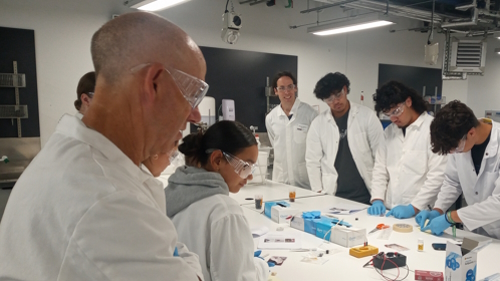
Joseph (top of the table) helps rangatahi in a lab session on dye-sensitised fruit-based solar cells, with camp organiser and MacDiarmid Institute Principal Investigator Professor Martin Allen, from the University of Canterbury (foreground).
Research Scientist Joseph Nelson (Ngāti Tūwharetoa, Ngāti Raukawa) didn’t need any persuading when the call went out for volunteers to help at the MacDiarmid Institute DiscoveryCamp over summer.
The annual residential camp for Māori and Pacific Island year 12 and 13 students brings rangatahi from around the country to do research with MacDiarmid Institute scientists, feeding their love of science and helping them decide on their careers. This year, it was in Ōtautahi, Christchurch.
“I first heard about the camp when a call went out for volunteers to help out as organisers, camp chaperones, helpers with lab visits and experiment sessions,” says Joseph, who is an Associate Investigator on two MacDiarmid Institute research projects.
“I remember attending my own high school summer camp, now more than 20 years ago in Auckland. This was quite a formative experience for me in terms of deciding my next steps after high school, and the camp volunteers were a big part of that. So, I was keen to volunteer.”
Joseph was a chaperone for the four-day camp – staying overnight in the university halls of residence with the students, offering any support they needed during their stay, and taking them to and from their lab visits and group outings.
The chaperones also helped in the lab and on outings, gave presentations and held a panel discussion about their own pathways into science.
Joseph says he really enjoyed the interaction with the rangatahi, hearing about their interest in science and plans for year 13 or university.
“They were a diverse group from many different parts of New Zealand and for many it was their first time visiting Christchurch, so it was great showing them around.
“The lab sessions were fantastic and really highlighted the breadth of research being done by MacDiarmid Institute in Canterbury – silicon wafer photolithography, making their own dye-sensitised fruit-based solar cells and then testing them outside in the sun, making real gold nanoparticles and imaging them using an electron microscope, and more.”
Would he do it again? “Yes! Absolutely! This was a great outreach opportunity, and I really enjoyed working with such a wonderful group of students.”


